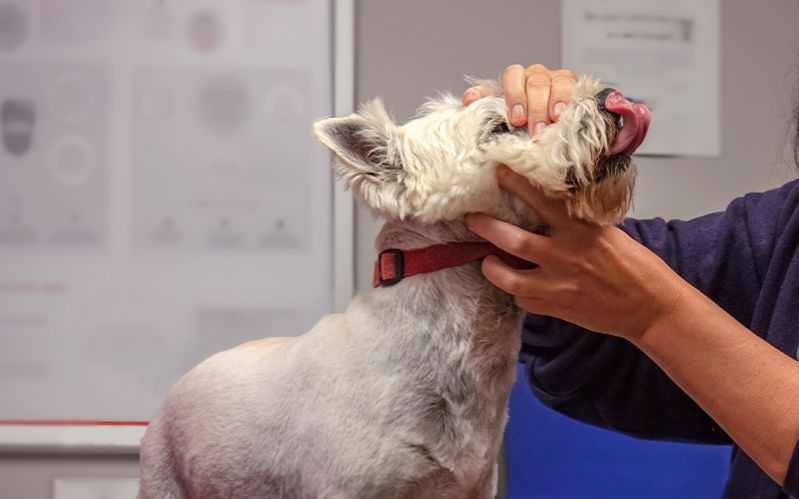
You may have heard of Addison’s disease in humans, but d
id you know that your dog can suffer from this condition too?
Addison’s disease is an autoimmune condition that affects the adrenal gland; causing the loss of endocrine tissue. This, in turn, leads to marked decreases in the production of glucocorticoid and mineralocorticoid hormones.
Further, this leads to a wide range of symptoms in impacted dogs including weakness, tremors, vomiting, depression, loss of appetite, and increased thirst and urination. If left untreated, Addison’s can be fatal due to the hormonal imbalance.
Fortunately, the condition does respond to treatment by a qualified veterinarian. But how much is the cost of dog’s Addison’s disease treatment?
In this article, we look more closely at what causes Addison’s disease, what treatment your dog will most likely need, and how much that treatment will cost.
Treatment Cost Breakdown
In this article, we discuss in detail the cost of treating Addison’s disease in dogs, specifically:
- Veterinary examinations (including laboratory screening tests)
- Optional Imaging
- Hospital treatment
- Hospitalization/Confinement
- Ongoing medication and testing
One should note that some breeds are predisposed to Addison’s, including Collies, Poodles, Labradors, Great Danes, and Rottweilers. Also, Addison’s disease can develop as a result of treatment for Cushing’s disease (Hyperadrenocorticism) where the dog’s body produces too much aldosterone and cortisol.
Also, 70% of affected dogs are female and are between the ages of 4 – 6. So if your dog meets those criteria and you see any of the previously described symptoms, you should act as quickly.
Costs of Treating Addison’s Disease in Dogs
As with many health conditions, Addison’s disease dog treatment cost can vary between cases. That means that there will most likely be a variance in the cost of treatment depending on what drugs your dog needs, the veterinary surgeon treating it, and the veterinary practice or specialist clinic involved.
- Veterinary Examination
Addison’s is a somewhat uncommon disease and can be hard to detect in many cases, especially as symptoms may only become pronounced once the disease has progressed significantly. Additionally, there are three presentations or subtypes of the illness.
Detection and treatment costs will depend on the timeline of the investigation, as well as the subtype of the disease.
Primary Addison’s is caused by adrenal dysfunction where the adrenal gland deteriorates through an autoimmune response.
Atypical Addison’s is a situation in which the adrenal cortex only stops production of cortisol but not other hormones. These cases are not as severe for the animal. However, it will eventually progress into typical or primary Addison’s after a few months which makes diagnosis challenging.
Secondary Addison’s also only affects cortisol production but it will not progress to the typical form of the disease and electrolyte imbalance does not occur.
All three types still require medication but the types of medication differ based on what hormones are needed to be boosted or outright replaced.
The indicators of Addison’s are somewhat broad as described above, so diagnosing it specifically can be a challenge. Of course, at the sign of any abnormal behavior or health with your animals, one should take them in to see the vet.
Standard exams run around $50 and will include heart and pulse checks, as a low pulse or irregular heartbeat can indicate Addison’s.
Bloodwork can help in diagnosis as dogs with the disease tend to have low sodium and high potassium levels, among other abnormalities. Urinalysis is also helpful for detecting Addison’s as the urine is usually diluted with it in dogs. This will run $70 to $250 depending on how extensive the bloodworm and urinalysis is.
The definitive test for addison’s is a blood test called an ACTH stimulation test. The ability of the adrenal gland to produce cortisol in response to ACTH is measured.
First your dog will have his blood drawn. ACTH will be administered. Your dog will need to remain at the veterinarian for two hours and his blood will be drawn again. This will run around $200 as it is a highly specialized test.
Lastly, an EKG can be used to examine changes in the heart that would occur due to high levels of potassium. This test costs around $50 to $100.

- Optional Imaging
Sometimes, imaging may be needed to rule out other causes of your dogs symptoms. It will also give your veterinarian information about how addison’s has affected your dog.
Radiographs – If radiographs are required, the average cost of these ranges from $60 to $180, depending on how many images are needed.
Abdominal ultrasound – The vet may carry out an abdominal ultrasound scan at the cost of between $250 and $500.
- Hospital Treatment
As mentioned, Addison’s is usually only detected once the dog is severely ill and so, short-term hospitalization may be required to help with recovery. IV drugs are administered to remedy dehydration and cortisol-like drugs are given to regulate hormone levels.
Most dogs will recover within a few hours from this. These drugs will run between $100 and $200.
- Hospitalization/Confinement
If your dog has suffered an Addisonian crisis, admission to a veterinary hospital is necessary. Hospitalization, although largely dependent on your location and specific clinic, may be in the ballpark of around $150 to $300 per day.
- Ongoing Medication and Testing
Following hospitalization, long-term treatment involves life-long drug therapy, which replaces the hormones that can no longer be produced. The hormone supplements can range in cost somewhat drastically, depending on the specific ones needed to be replaced, as well as your dog’s response to the treatment.
Larger dogs will need larger doses of medication and so may end up costing more. Generally speaking, these meds will run for about $50 to $200 a month.
Dogs with Addison’s on appropriate drug therapy regimens have great prognoses and their life expectancies are not expected to be affected unless other health problems arise. Most vets recommend the dog be brought in every 3 months to continue monitoring its bloodwork.
